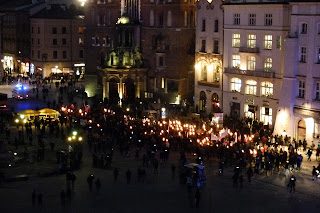Probably a couple more posts to draw from my Krakow experiences.
At the Galician Jewish Museum in Kasmierz, Krakow, there was a remarkable exhibition of small drawings.
Ryszard (Richard, I guess) Apte was the son of a leading Krakow Jewish family, part of the intellectual elite of the city, pretty well-assimilated - liberal Jews, not ultra-Orthodox. That's his caricature self-portait, on the left. He was very talented, in languages, music, and art. Such achievements, such distinctions counted for nothing in the face of genocide. On the right above,a little shadowman seems to be pleading with a house that leans over and towards him. For shelter? For escape from the lethal streets?
To cut a long and awful story short, his family shuttled to and fro, escaping the Nazis and heading East, to Lvov, but finding the Soviet occupation there brutal and oppressive.
In 1941, Hitler invaded the Soviet Union. German forces occupied Lvov, and they and Ukranian troops launched brutal pogroms against the Jews there. So the Aptes went back to a town outside Krakow, Wieliczka.
At first, life there seemed almost normal. Richard carried on drawing. He knew what was going on around him; he had a feeling he would not survive the war and said that it did not matter to him. He only wanted to save his work from destruction.
In 1942 the round ups and deportations to the camps began. When they came for the Aptes, Richard's mother, who was paralysed, was shot on the spot. Richard went to a work camp with a cousin, escaped, and was recaptured and killed. He was 17 or 18.
In these frail school-type exercise books, his work did indeed survive; it only came to light quite recently. The exhibition at the Galician Jewish Life museum was entitled "Anxiety."
This drawing is called "Ghosts at the Hairdressers." Here's how I see it: there's no-one in the barber's chair, just a terrified face in the mirror, and a huge skeleton cutting his hair. So the anxieties of life at the time sweep away the reassuring normalities of the settled life he'd had until 1939. Even the barber shop is a place of ghosts, terrors and absences. The skeleton it is that is most sharply outlined. In Poland in 1940/41, death will cut your hair for you, because you'll soon be his.
Several of the drawings seem to me to have a similar theme. Others, like the one below, use some symbolism drawn from Christianity, and feature German soldiers. Almost incredibly, it seems to me, Apte was realising a vision of what their cruelty and wickedness might mean to the German soldiers, in their own terms, their own iconography.
This drawing is entitled "Bitter Wisdom." A Christ-like figure has a barbed-wire crown of thorns, and German soldiers are suffering and dying in front of him.
Another drawing, "Pietà," shows an ancient face in the sort of robes Mary is usually portrayed as wearing, behind a dead male figure holding his hand over a big chest wound. Behind them both is a cross with a German soldier's helmet on it.
The final picture is "Absolution." A serene Christ-like figure, with a crown of thorns and extended arms, is looking down at skulls in German helmets.
How astonishing that a young man could capture so much of the meaning of what was happening around him, and turn it into powerful symbolism that still speaks to us.
There is an excellent catalogue to the exhibition, which you can purchase very reasonably online from the museum bookshop at:
http://www.shop.galiciajewishmuseum.org//
So out of the sordid foulness and cruelty of the life around him, a teenager finds these visions, and hopes they will survive him.
They survive, Ryszard, and they echo, they warn and they inspire.
















